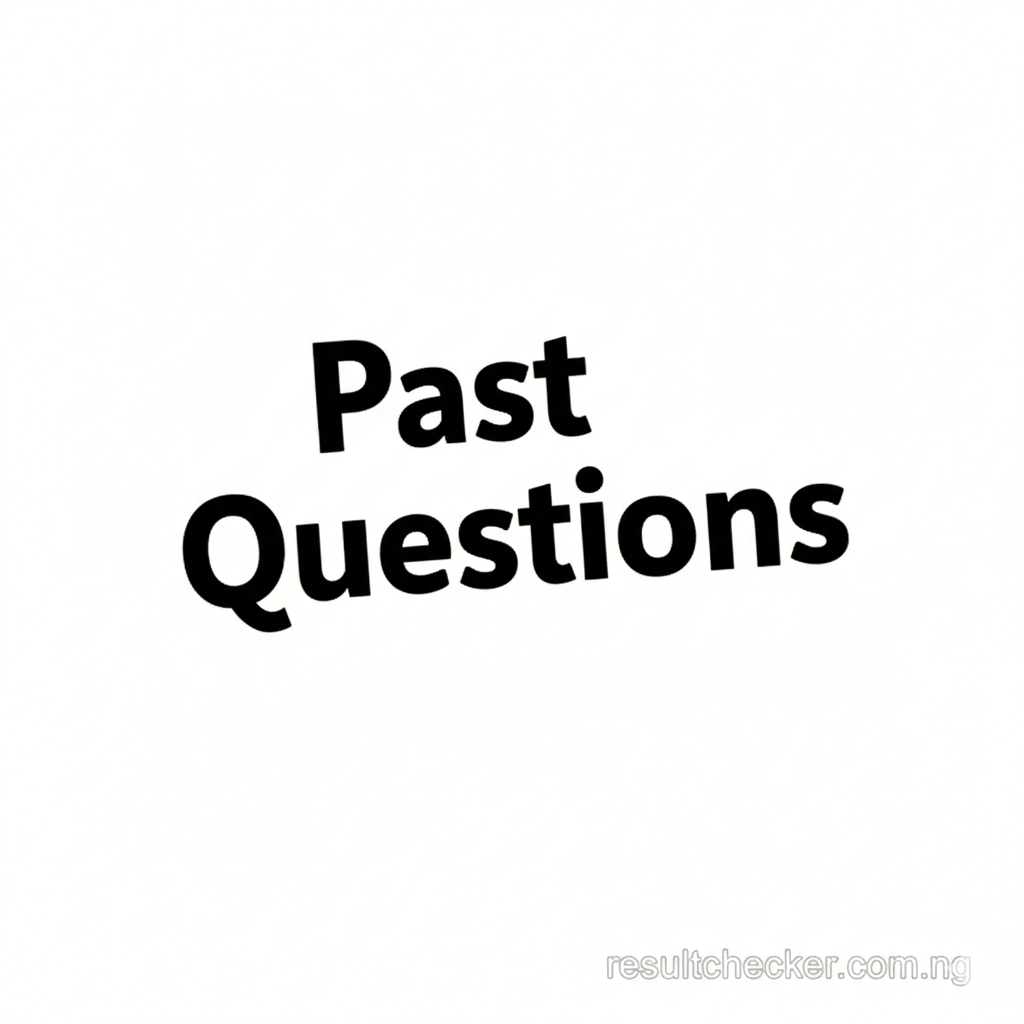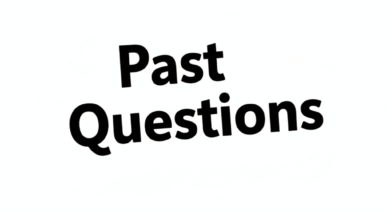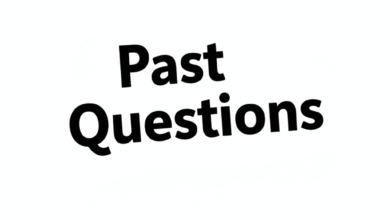JAMB English Past Questions: Practice Questions & Answers (2025/2026)

JAMB English Past Questions, Preparing for the JAMB Use of English paper is crucial for every candidate. Alongside Mathematics, English is a compulsory subject, and your performance in it significantly impacts your overall UTME score.
The best way to build your confidence, improve your speed, and understand the exam pattern is by engaging with past questions.
This guide provides 50 likely practice questions designed to mirror the JAMB format. Use them to test your knowledge and prepare effectively for the 2025/2026 UTME.
Disclaimer: These are practice questions to help you prepare. They are not leaked or actual questions from the upcoming exam.
Section 1: Nearest in Meaning (Synonyms)
From the options lettered A to D, choose the option that is nearest in meaning to the word or phrase in italics.
1. The witness gave a cogent reason for his actions. A. weak B. convincing C. false D. silly
2. The old building is beginning to disintegrate. A. grow B. improve C. collapse D. shine
3. His ephemeral success was soon forgotten. A. lasting B. remarkable C. short-lived D. deserved
4. The governor’s speech was quite laconic. A. long B. brief C. loud D. boring
5. She has an insatiable appetite for knowledge. A. small B. normal C. unquenchable D. strange
6. The lawyer pointed out the fallacy in the prosecutor’s argument. A. strength B. truth C. evidence D. mistaken belief
7. He is known for his meticulous attention to detail. A. careless B. powerful C. casual D. thorough
8. The issue caused a schism within the political party. A. unity B. division C. debate D. problem
9. The athlete’s prowess on the field was undeniable. A. failure B. presence C. skill D. attitude
10. His comments were clearly superfluous. A. necessary B. unnecessary C. intelligent D. helpful
Section 2: Opposite in Meaning (Antonyms)
From the options lettered A to D, choose the option that is most opposite in meaning to the word or phrase in italics.
11. The teacher is very erudite. A. knowledgeable B. ignorant C. strict D. kind
12. The company’s future looks precarious. A. dangerous B. secure C. bright D. uncertain
13. The room was filled with a cacophony of sounds. A. harmony B. noise C. music D. silence
14. His alacrity in responding to the emergency was praised. A. speed B. slowness C. wisdom D. courage
15. The evidence against him was incontrovertible. A. clear B. false C. questionable D. strong
16. The politician is known for being pragmatic. A. practical B. idealistic C. sensible D. foolish
17. His ostentatious display of wealth made people uncomfortable. A. modest B. lavish C. poor D. impressive
18. The president decided to assent to the bill. A. agree B. reject C. consider D. sign
19. The story he told was completely plausible. A. believable B. interesting C. unbelievable D. long
20. Her gregarious nature made her the life of the party. A. friendly B. quiet C. unsociable D. funny
Section 3: Completing the Sentence
From the options lettered A to D, choose the one that best completes the sentence.
21. The committee _____ submitted its report. A. has B. have C. are D. were
22. If you had arrived earlier, you _____ the start of the movie. A. would have seen B. would see C. will see D. saw
23. The manager, along with his two assistants, _____ planning the event. A. are B. were C. is D. have been
24. I would rather stay at home _____ go to the party. A. than B. to C. instead D. but
25. He has no respect _____ his elders. A. to B. for C. with D. against
26. The security guard prevented the students _____ entering the hall. A. from B. to C. against D. for
27. _____ you work hard, you will not succeed. A. Although B. Because C. Unless D. If
28. The patient is slowly recovering _____ his illness. A. of B. from C. with D. by
29. My father prefers tea _____ coffee. A. than B. over C. to D. against
30. A number of soldiers _____ injured in the attack. A. was B. is C. has been D. were
Section 4: Oral English
From the options lettered A to D, choose the one that has the same sound as the one represented by the underlined letter(s).
31. pool A. look B. blood C. group D. door
32. church A. pure B. work C. four D. tour
33. high A. big B. eight C. key D. buy
34. enough A. dough B. plough C. rough D. through
From the options lettered A to D, choose the one that has the correct stress pattern. The stressed syllable is in capital letters.
35. international A. inTERnational B. interNAtional C. internaTIONal D. internatioNAL
36. examination A. exaMInation B. exaMIÑAtion C. examiNAtion D. examinaTION
37. academic A. AcaDEmic B. aCAdeMIC C. acaDEmic D. ACAdemic
38. political A. poLItical B. POlitical C. poliTIcal D. politiCAL
39. democratic A. deMOcratic B. demoCRAtic C. DEMOcratic D. democraTIC
40. economics A. EConomics B. ecoNOmics C. econoMICS D. ecoNOmiCS
Section 5: Interpretation
From the options lettered A to D, choose the interpretation that you consider most appropriate for the sentence.
41. The politician decided to wash his hands of the matter. A. to solve the problem B. to take responsibility for the problem C. to refuse to be responsible for the problem D. to clean up the mess
42. My grandfather is as fit as a fiddle. A. very old B. very musical C. very sick D. very healthy and strong
43. When the boss appeared, the lazy workers began to pull their socks up. A. to dress properly B. to improve their performance C. to run away D. to get ready for a fight
44. The teacher told the noisy student that his behavior was beyond the pale. A. acceptable B. excellent C. unacceptable D. funny
45. He hit the nail on the head when he identified the main cause of our failure. A. hurt someone’s feelings B. made a lucky guess C. described a situation exactly D. created a problem
Section 6: Comprehension
Read the passage below and answer the questions that follow.
Climate change represents a fundamental threat to the places, species, and people’s livelihoods. The Earth’s climate has always changed, but the current warming trend is of particular significance because it is proceeding at an unprecedented rate and is primarily the result of human activity. The emission of greenhouse gases, such as carbon dioxide from the burning of fossil fuels, traps heat in the atmosphere, leading to a rise in global temperatures.
This warming causes a cascade of effects, including melting glaciers, rising sea levels, and more extreme weather events like hurricanes and droughts. Addressing this challenge requires a global effort to transition to renewable energy sources and adopt more sustainable practices.
46. According to the passage, the current climate change is unique because of its: A. natural causes B. slow progression C. speed and human origin D. minimal impact
47. The main cause of the current warming trend mentioned in the passage is: A. volcanic eruptions B. changes in the sun’s energy C. burning of fossil fuels D. natural climate cycles
48. What is the direct effect of greenhouse gases mentioned in the passage? A. They cool the atmosphere. B. They trap heat in the atmosphere. C. They cause earthquakes. D. They create clouds.
49. Which of the following is NOT listed as a consequence of global warming? A. Rising sea levels B. Increased volcanic activity C. Melting glaciers D. More extreme weather
50. The passage suggests that the solution to climate change requires: A. individual countries working alone B. waiting for the climate to fix itself C. a coordinated international effort D. reducing all forms of energy use
Correct Answers and Explanations
1. B – convincing: “Cogent” means clear, logical, and convincing.2. C – collapse: To “disintegrate” means to break up into small parts, typically as the result of impact or decay. 3. C – short-lived: “Ephemeral” means lasting for a very short time. 4. B – brief: “Laconic” means using very few words. 5. C – unquenchable: “Insatiable” means impossible to satisfy.
6. D – mistaken belief: A “fallacy” is a mistaken belief, especially one based on an unsound argument. 7. D – thorough: “Meticulous” means showing great attention to detail; very careful and precise. 8. B – division: A “schism” is a split or division between strongly opposed sections or parties. 9. C – skill: “Prowess” means skill or expertise in a particular activity or field. 10. B – unnecessary: “Superfluous” means unnecessary, especially through being more than enough.
11. B – ignorant: “Erudite” means having or showing great knowledge; the opposite is ignorant. 12. B – secure: “Precarious” means not securely held or in position; dangerously likely to fall or collapse. The opposite is secure. 13. A – harmony: “Cacophony” is a harsh, discordant mixture of sounds. The opposite is harmony.
14. B – slowness: “Alacrity” means brisk and cheerful readiness. The opposite is slowness or reluctance. 15. C – questionable: “Incontrovertible” means not able to be denied or disputed. The opposite is questionable. 16. B – idealistic: “Pragmatic” means dealing with things sensibly and realistically. The opposite is idealistic, which is based on ideals rather than practical considerations.
17. A – modest: “Ostentatious” means a pretentious and vulgar display of wealth designed to impress. The opposite is modest. 18. B – reject: To “assent” means to express approval or agreement. The opposite is to reject. 19. C – unbelievable: “Plausible” means seeming reasonable or probable.
The opposite is unbelievable. 20. C – unsociable: “Gregarious” means fond of company; sociable. The opposite is unsociable. 21. A – has: “The committee” is a collective noun treated as a single unit.
22. A – would have seen: This is a third conditional sentence structure (If + past perfect, would have + past participle). 23. C – is: The verb agrees with the main subject (“The manager”), not the phrase that follows. 24. A – than: The structure “would rather…than…” is used to express preference.
25. B – for: The correct preposition to use with “respect” is “for.” 26. A – from: The verb “prevented” is followed by “from.” 27. C – Unless: “Unless” means “except if,” which fits the logic of the sentence.
28. B – from: The correct preposition for “recovering” from an illness is “from.” 29. C – to: The verb “prefers” is followed by “to” when comparing two things. 30. D – were: “A number of” is treated as plural, so it takes a plural verb. 31. C – group: Both ‘pool’ and ‘group’ have the /u:/ sound.
32. B – work: Both ‘church’ and ‘work’ have the /ɜ:/ sound. 33. D – buy: Both ‘high’ and ‘buy’ have the /aɪ/ diphthong. 34. C – rough: Both ‘enough’ and ‘rough’ end with the /f/ sound. 35. B – interNAtional: The primary stress is on the third syllable, ‘NA’. 36. C – examiNAtion: The primary stress is on the fourth syllable, ‘NA’.
37. C – acaDEmic: The primary stress is on the third syllable, ‘DE’. 38. A – poLItical: The primary stress is on the second syllable, ‘LI’. 39. B – demoCRAtic: The primary stress is on the third syllable, ‘CRA’. 40. B – ecoNOmics: The primary stress is on the third syllable, ‘NO’. 41. C – to refuse to be responsible for the problem: This idiom means to abandon or disown something. 42. D – very healthy and strong: This idiom means to be in excellent physical condition.
43. B – to improve their performance: This idiom means to make a greater effort. 44. C – unacceptable: This idiom means outside the bounds of acceptable behavior. 45. C – described a situation exactly: This idiom means to be precisely correct in a statement or assessment.
46. C – speed and human origin: The passage states the warming is at an “unprecedented rate” and is the “result of human activity.” 47. C – burning of fossil fuels: The passage specifies this as the source of greenhouse gases like carbon dioxide. 48. B – They trap heat in the atmosphere: The passage explicitly states that greenhouse gases “trap heat in the atmosphere.”
49. B – Increased volcanic activity: The passage lists melting glaciers, rising sea levels, and extreme weather, but not volcanic activity. 50. C – a coordinated international effort: The passage states that addressing the challenge “requires a global effort.”
The ‘Calculation’ Aspect of JAMB English
While Use of English doesn’t involve mathematical formulas in its questions, your final score is “calculated” by JAMB. Here is how it works:
1. Raw Score: This is simply the number of questions you answer correctly. For example, if you answered 42 out of the 50 questions above correctly, your raw score would be 42.
2. Scaled Score: JAMB converts your raw score into a scaled score out of 100. This is done to ensure fairness across different versions of the test.
- Formula: (Your Raw Score / Total Questions) * 100
- Example Calculation: (42 / 50) * 100 = 84
This score of 84 would be your Use of English score. It is then added to the scores from your other three subjects to give your total UTME score out of 400.


